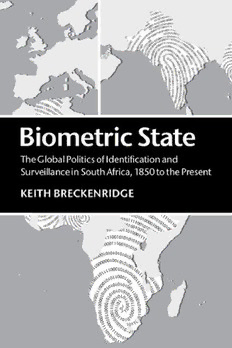
Biometric State: The Global Politics Of Identification And Surveillance In South Africa, 1850 To The Present PDF
Preview Biometric State: The Global Politics Of Identification And Surveillance In South Africa, 1850 To The Present
Biometric State Biometric identification and registration systems are being proposed by governments and businesses across the world. Surprisingly they are under most rapid, and systematic, development in countries in Africa and Asia. In this ground-breaking book Keith Breckenridge traces how the origins of the systems being developed in places like India, Mexico, Nigeria and Ghana can be found in a century-long history of biomet- ric government in South Africa, with the South African experience of centralised fingerprint identification unparalleled in its chronological depth and demographic scope. He shows how empire, and particu- larly the triangular relationship between India, the Witwatersrand and Britain, established the special South African obsession with biomet- ric government, and shaped the international politics that developed around it for the length of the twentieth century. He also examines the political effects of biometric registration systems, revealing their con- sequences for the basic workings of the institutions of democracy and authoritarianism. KeItH BrecKeNrIdGe is an Associate Professor and the deputy director at the Wits Institute for Social and economic research at the University of the Witwatersrand. Biometric State The Global Politics of Identification and Surveillance in South Africa, 1850 to the Present Keith Breckenridge University of the Witwatersrand University Printing House, cambridge cB2 8BS, United Kingdom cambridge University Press is part of the University of cambridge. It furthers the University’s mission by disseminating knowledge in the pursuit of education, learning and research at the highest international levels of excellence. www.cambridge.org Information on this title: www.cambridge.org/9781107077843 © Keith Breckenridge 2014 this publication is in copyright. Subject to statutory exception and to the provisions of relevant collective licensing agreements, no reproduction of any part may take place without the written permission of cambridge University Press. First published 2014 Printed in the United Kingdom by clays, St Ives plc A catalogue record for this publication is available from the British Library Library of Congress Cataloguing in Publication data Breckenridge, Keith, author. Biometric state : the global politics of identification and surveillance in South Africa, 1850 to the present / Keith Breckenridge, University of the Witwatersrand. pages cm Includes bibliographical references and index. ISBN 978-1-107-07784-3 (hardback) 1. citizenship–South Africa–History. 2. Biometric identification– Government policy–South Africa–History. 3. Biometric identification– Political aspects–South Africa–History. 4. South Africa–Politics and government–19th century. 5. South Africa–Politics and government–20th century. I. title. JQ1983.B74 2014 323.44830968–dc23 2014022526 ISBN 978-1-107-07784-3 Hardback cambridge University Press has no responsibility for the persistence or accuracy of UrLs for external or third-party internet websites referred to in this publication, and does not guarantee that any content on such websites is, or will remain, accurate or appropriate. For catherine and Alexandra, who remind me that writing is not life contents List of figures page viii Preface and acknowledgements ix Introduction: the global biometric arena 1 1 Science of empire: the South African origins and objects of Galtonian eugenics 27 2 Asiatic despotism: edward Henry on the Witwatersrand 63 3 Gandhi’s biometric entanglement: fingerprints, satyagraha and the global politics of Hind Swaraj 90 4 No will to know: biometric registration and the limited curiosity of the gatekeeper state 115 5 Verwoerd’s bureau of proof: the Apartheid Bewysburo and the end of documentary government 138 6 Galtonian reversal: apartheid and the making of biometric citizenship 164 epilogue: empire and the mimetic fantasy 196 conclusion 213 Bibliography 219 Index 249 vii Figures 5.1 Fingerprinting is necessary step in issuance of all-important pass legalizing workman’s presence in white area for duration of his job. [caption from House of Bondage] © the ernest cole Family trust. courtesy of the Hasselblad Foundation 162 5.2 People line up at Bantu Administration building to apply for passes. Line starts forming at 5:30 a.m., and latecomers may not get in. Without passes they are liable to arrest. [caption from House of Bondage] © the ernest cole Family trust. courtesy of the Hasselblad Foundation 162 5.3 during a ‘swoop’, police are everywhere, checking passes. Young boy is stopped for his pass as white plainclothesman looks on. checks go on in the townships, too. [caption from House of Bondage] © the ernest cole Family trust. courtesy of the Hasselblad Foundation 163 Map countries with biometric civil and voting registration schemes 17 viii
